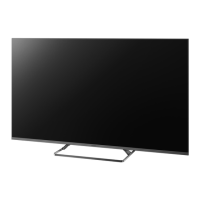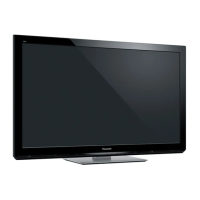Why is the power LED blinking 3 times on my Panasonic TH-L32C4M?
- HHannah DiazAug 6, 2025
If the power LED on your Panasonic LCD TV blinks 3 times, it means that the TCON power is down.
Why is the power LED blinking 3 times on my Panasonic TH-L32C4M?
If the power LED on your Panasonic LCD TV blinks 3 times, it means that the TCON power is down.
What does it mean when the power LED is blinking 1 time on my Panasonic TH-L32C4M?
If the power LED on your Panasonic LCD TV is blinking once, it indicates an SOS signal from the PANEL inverter.
Outlines general safety practices and precautions to be observed during servicing procedures.
Details the procedure for measuring leakage current when the equipment is cold.
Details the procedure for measuring leakage current when the equipment is operating.
Provides techniques to prevent damage to sensitive electronic components from electrostatic discharge.
Explains the properties and safe handling procedures for lead-free solder.
Guidance on board identification and basic service-related tips for navigation.
Comprehensive list of the TV's technical specifications, including display, sound, and connectivity.
Step-by-step instructions on how to access the television's service mode.
Details the adjustable parameters and their sample data within the service mode.
Procedures for safely exiting the service mode after adjustments.
Explanation of the SRV-TOOL, including access, SOS history, and power count.
Instructions on how to activate and use the self-check diagnostic mode.
Guide on checking the IIC bus lines for proper communication and function.
Reference chart correlating power LED blinking patterns to specific fault conditions.
Diagnostic steps and checks for troubleshooting a unit that does not power on.
Step-by-step guide for correctly routing and securing the AC power cord.
Instructions for preparing and mounting the speaker units into the cabinet.
Precautions and methods for safely installing and handling the LCD panel.
Procedures for fixing the LCD panel and internal PCBs, including screw and connector details.
Instructions for applying speaker sponges to the back cover.
Steps for installing the VESA mounting metal bracket and securing panel wires.
Guide for correctly installing the LVDS data cable.
Details on how to fix the back cover using the specified screws and mounting holes.
Steps for preparing and assembling the stand for mounting the TV.
Table of expected voltage levels at various test points on the A-board.
Table of expected voltage levels at various test points on the P-board.
Overview of the main functional blocks and their interconnections within the TV system.
Diagram illustrating the first set of wire routing and management procedures.
Diagram illustrating the second set of wire routing and management procedures.
Explanations of symbols, conventions, and measurement conditions used in schematics.
Detailed schematics for the A-board, covering multiple sheets.
Schematic diagram for the GK board, detailing its components and connections.
Detailed schematics for the KA-board, presented in two parts.
Detailed schematics for the P-board, presented in four parts.
Top and bottom component placement diagrams for the A-board.
Component placement diagrams for the GK-board (top and bottom views).
Component placement diagrams for the KA-board (top and bottom views).
Component placement diagrams for the P-board (top and bottom views).
Information on accessing exploded views and mechanical replacement parts.
Introduction to the list of electrical components available as replacement parts.
Notes and abbreviations related to the electrical replacement parts list, including RTL.












